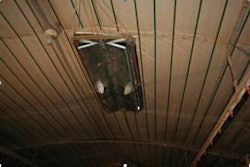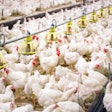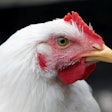In-house litter composting has been shown to reduce bacteria in broiler litter, according to a USDA study sponsored by the U.S. Poultry & Egg Association. Reduction in natural flora of waste residual, however, may lead to increased re-colonization of other bacteria pathogens due to reduced competition.
Laboratory trials for the study, "Project #662: Bacterial Re-colonization of In-House Composted Broiler Litter," were conducted to:
- Determine re-colonization of food-borne bacterial pathogens (by inoculation with Salmonella, Campylobacter, Clostridium and Listeria) in composted and non-composted litter
- Identify bacteria associated with reduced pathogen re-colonization
- Correlate ammonia levels on pathogen re-colonization.
Food-borne bacteria were higher in composted litter in weeks one and two. However, bacterial levels were identical in both litter treatments by week seven. Upon ceasing addition of inoculated fecal matter, food-borne bacterial pathogens were overtaken by normal litter bacteria in both treatments. No differences could be attributed to ammonia levels.
The study concludes that while initial (week one and two) microbial levels were reduced and food-borne pathogens were increased in composted litter, bacterial levels were similar in composted and non-composted litter treatments by week seven.















